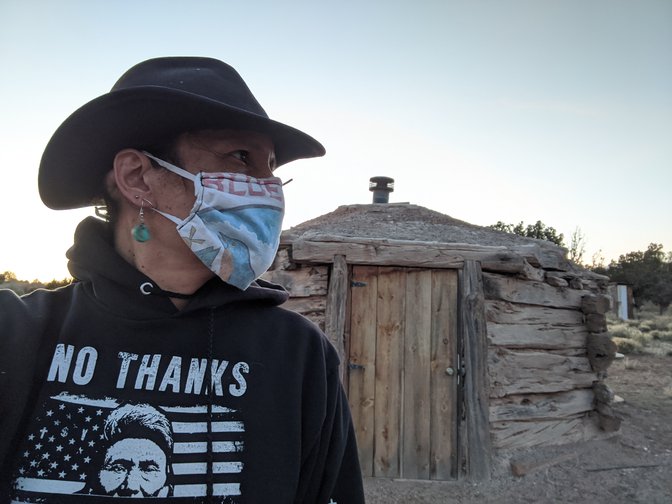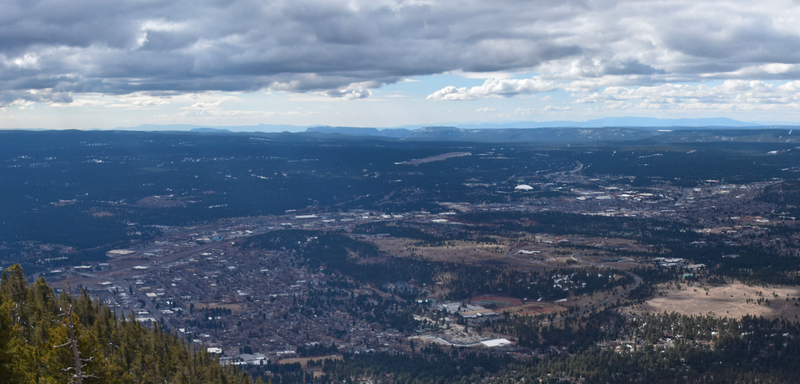All people without shelter in this pandemic should be considered refugees
In an extract from the new book ‘Pandemic Solidarity: Mutual Aid During the Covid-19 Crisis’, Klee Benally reports from the Navajo Nation.
Klee Benally, 2020 |Courtesy of Klee Benally
This is a humanitarian crisis, and so all people without shelter in this pandemic should be considered refugees.
On 14 March, inspired by the amazing mutual aid mobilisations throughout Turtle Island [what my community call North America] I contacted a local street medic crew to see about interest in initiating a localised project. That was the spark we needed. The framework for mutual aid groups was already established, we just needed a model to draw and build from. It happened organically as an extension of work we had been doing out of Táala Hooghan Infoshop [an Indigenous-run resource centre in Flagstaff, Arizona] since 2007.
We built a Facebook group and Google form, and borrowed from the DC Mutual Aid framework of establishing a Hub (to coordinate volunteers and requests), a supply site (Táala Hooghan Infoshop) and delivery (from the volunteer forms). We scoured the web for the best protocols, compiling enough info and resources to spring into action.
Since then Kinlani (Flagstaff) Mutual Aid has grown, doing daily support throughout the region. As politicians in the so-called ‘US’ urged people to stock up on two weeks of supplies, my relative Ethel Branch saw the looming crisis. For the Diné and Hopi reservation, with a population base of about 200,000 people, there are only thirteen grocery stores.
And as greedy hoarders left shelves empty in the settlements on the periphery of the reservation, she knew there could be a crisis for our elders. She quickly coordinated a GoFundMe for Diné and Hopi elders, gaining an amazing amount of momentum. We connected and I started coordinating out of Táala Hooghan. We mobilised Kinlani Mutual Aid volunteers to gather supplies, deliver food and sanitise entire trucks. This was right before the tragedy in Chilchinbito on our reservation.
On 18 March, two cases of COVID-19 were confirmed in this incredibly remote Diné community. We now have 1,540 cases on the reservation. Per capita, if you compare our population to so-called US states, we have been the third most impacted after New Jersey and New York [by 18 May we were in first place]. My priorities right now are our elders and unsheltered relatives. Most businesses are shut down in Flagstaff.

We built a Facebook group and Google form, and borrowed from the DC Mutual Aid framework of establishing a Hub (to coordinate volunteers and requests), a supply site (Táala Hooghan Infoshop) and delivery (from the volunteer forms). We scoured the web for the best protocols, compiling enough info and resources to spring into action.
Since then Kinlani (Flagstaff) Mutual Aid has grown, doing daily support throughout the region. As politicians in the so-called ‘US’ urged people to stock up on two weeks of supplies, my relative Ethel Branch saw the looming crisis. For the Diné and Hopi reservation, with a population base of about 200,000 people, there are only thirteen grocery stores.
And as greedy hoarders left shelves empty in the settlements on the periphery of the reservation, she knew there could be a crisis for our elders. She quickly coordinated a GoFundMe for Diné and Hopi elders, gaining an amazing amount of momentum. We connected and I started coordinating out of Táala Hooghan. We mobilised Kinlani Mutual Aid volunteers to gather supplies, deliver food and sanitise entire trucks. This was right before the tragedy in Chilchinbito on our reservation.
On 18 March, two cases of COVID-19 were confirmed in this incredibly remote Diné community. We now have 1,540 cases on the reservation. Per capita, if you compare our population to so-called US states, we have been the third most impacted after New Jersey and New York [by 18 May we were in first place]. My priorities right now are our elders and unsheltered relatives. Most businesses are shut down in Flagstaff.

Most of the resources for unsheltered folks are not available to them except the shelters – where they kick out relatives at 5am and treat them worse than most kennels treat animals. The negligence is abhorrent.
The Flagstaff politicians had no plan for unsheltered relatives. I’ve been on the ground at Táala Hooghan every day, talking with them and locating resources. That work led me to build emergency wash stations. I made a zine, and now it’s being shared across Turtle Island as a simple DIY model for basic hygiene.
The idea of collective care and support, of ensuring the well-being of all our relations in non-hierarchical voluntary associations and taking direct action has always been something that translated easily for me. That’s how I was raised. T’áá hwó’ ají t’éego means, if it is going to be, it is up to you. No one will do it for you.
The Flagstaff politicians had no plan for unsheltered relatives. I’ve been on the ground at Táala Hooghan every day, talking with them and locating resources. That work led me to build emergency wash stations. I made a zine, and now it’s being shared across Turtle Island as a simple DIY model for basic hygiene.
The idea of collective care and support, of ensuring the well-being of all our relations in non-hierarchical voluntary associations and taking direct action has always been something that translated easily for me. That’s how I was raised. T’áá hwó’ ají t’éego means, if it is going to be, it is up to you. No one will do it for you.
“If it is going to be, it is up to you. No one will do it for you”
We also have a Diné philosophy rooted in Ké’, or our familial relations, which means that no one would ever be left to fend for themselves; we are all relatives in some way, so we have to care for each other. We built these understandings into Táala Hooghan Infoshop from the beginning.
It’s not so much about adapting as it is about scaling our efforts to meet the critical needs of our people. The crisis around COVID-19 has magnified the existing crises of capitalism and colonialism. It is hardest to address the safety protocols with unsheltered relatives, some of whom may have substance use or mental health issues. That’s an ongoing process of working with a community that depends in many ways on social proximity for survival.
The Navajo Nation also has significant infrastructure challenges: a third of households don’t have running water or electricity. Internet access is also limited in many remote areas, so the organising has to be more direct or rely on other channels such as radio.
We’re organising with the vision that these efforts have the power to make capitalism and colonialism irrelevant. We are actively establishing interventions to ensure that these systems don’t recuperate. To that end, we’ve established an Indigenous Mutual Aid network to build connections through and beyond this crisis.
Since most of the current Indigenous mutual aid organising is an extension of work that has been ongoing in sacred land and water struggles, for unsheltered relatives or elder support, we already have a lot of those deep relationships and experiences working together. We want to radically redistribute resources and power, but we also don’t want to be burdened by leftist political baggage.
In many ways, that and the threat of non-profit industrial co-optation are perhaps our biggest challenges. That’s part of why we’re asserting the need for a specific tendency of Indigenous Mutual Aid; we’ve dealt with white saviours and so much ‘decolonial’ fetishism from radicals. We need them to get out of the way, so we can do what we need to do. They have a role, but if we’re not organising on our own terms then it’s the same charity bullshit we’ve faced before, no matter how much people say it’s ‘solidarity’.
I’ve grown up in a world of ruins. We have teachings and prophecies of the endings of cycles, but that’s always how it’s been here. An anti-colonial and anti-capitalist world already exists, but as my father, who is a traditional medicine practitioner, says: “There aren’t two worlds, there is just one world with many paths.”
Colonial and capitalist paths are linear by design. If that path of greed, domination, exploitation and competition doesn’t accept that it’s reached its dead end, then we have to make sure of it.
It’s not so much about adapting as it is about scaling our efforts to meet the critical needs of our people. The crisis around COVID-19 has magnified the existing crises of capitalism and colonialism. It is hardest to address the safety protocols with unsheltered relatives, some of whom may have substance use or mental health issues. That’s an ongoing process of working with a community that depends in many ways on social proximity for survival.
The Navajo Nation also has significant infrastructure challenges: a third of households don’t have running water or electricity. Internet access is also limited in many remote areas, so the organising has to be more direct or rely on other channels such as radio.
Indigenous mutual aid
I’m surprised and inspired every day on how widely the concept of mutual aid has spread. On the one hand, there’s a level of non-profit and liberal co-optation, but on the other, mutual aid can only really be co-opted so much due to the inherent contradictions within settler colonial societies and capitalism. The biggest challenge is how hard our remote communities on the reservation have been hit. Many of these spaces are where our elders live – who do not speak English and continue to be caretakers of our cultural knowledge systems.We’re organising with the vision that these efforts have the power to make capitalism and colonialism irrelevant. We are actively establishing interventions to ensure that these systems don’t recuperate. To that end, we’ve established an Indigenous Mutual Aid network to build connections through and beyond this crisis.
Since most of the current Indigenous mutual aid organising is an extension of work that has been ongoing in sacred land and water struggles, for unsheltered relatives or elder support, we already have a lot of those deep relationships and experiences working together. We want to radically redistribute resources and power, but we also don’t want to be burdened by leftist political baggage.
In many ways, that and the threat of non-profit industrial co-optation are perhaps our biggest challenges. That’s part of why we’re asserting the need for a specific tendency of Indigenous Mutual Aid; we’ve dealt with white saviours and so much ‘decolonial’ fetishism from radicals. We need them to get out of the way, so we can do what we need to do. They have a role, but if we’re not organising on our own terms then it’s the same charity bullshit we’ve faced before, no matter how much people say it’s ‘solidarity’.
I’ve grown up in a world of ruins. We have teachings and prophecies of the endings of cycles, but that’s always how it’s been here. An anti-colonial and anti-capitalist world already exists, but as my father, who is a traditional medicine practitioner, says: “There aren’t two worlds, there is just one world with many paths.”
Colonial and capitalist paths are linear by design. If that path of greed, domination, exploitation and competition doesn’t accept that it’s reached its dead end, then we have to make sure of it.


No comments:
Post a Comment
Note: only a member of this blog may post a comment.